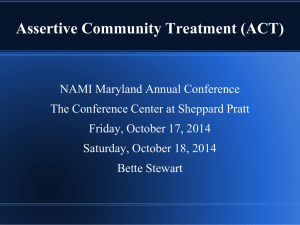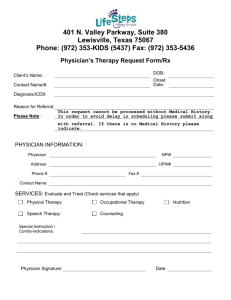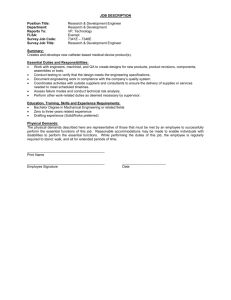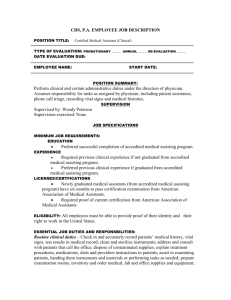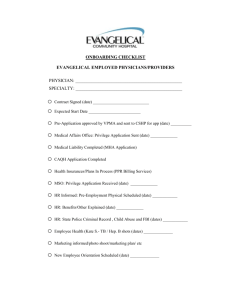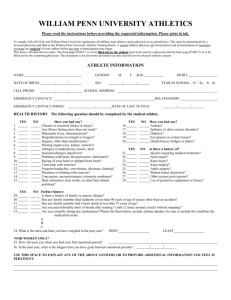Practice Medicine, Definition under Maryland Law “Practice
advertisement
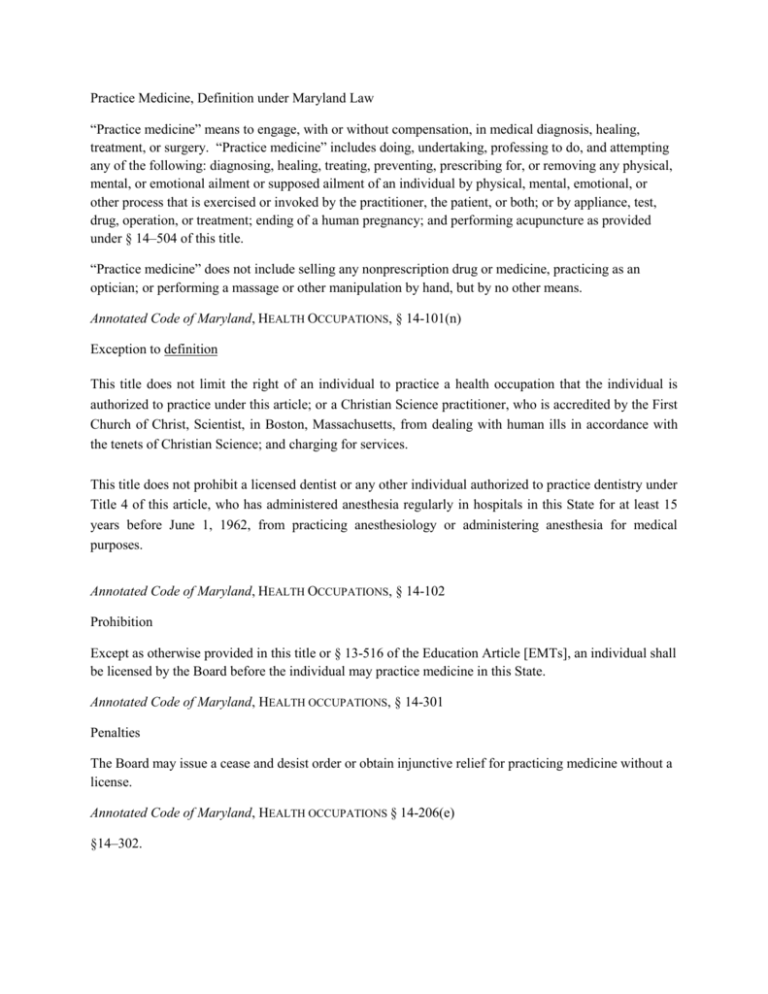
Practice Medicine, Definition under Maryland Law “Practice medicine” means to engage, with or without compensation, in medical diagnosis, healing, treatment, or surgery. “Practice medicine” includes doing, undertaking, professing to do, and attempting any of the following: diagnosing, healing, treating, preventing, prescribing for, or removing any physical, mental, or emotional ailment or supposed ailment of an individual by physical, mental, emotional, or other process that is exercised or invoked by the practitioner, the patient, or both; or by appliance, test, drug, operation, or treatment; ending of a human pregnancy; and performing acupuncture as provided under § 14–504 of this title. “Practice medicine” does not include selling any nonprescription drug or medicine, practicing as an optician; or performing a massage or other manipulation by hand, but by no other means. Annotated Code of Maryland, HEALTH OCCUPATIONS, § 14-101(n) Exception to definition This title does not limit the right of an individual to practice a health occupation that the individual is authorized to practice under this article; or a Christian Science practitioner, who is accredited by the First Church of Christ, Scientist, in Boston, Massachusetts, from dealing with human ills in accordance with the tenets of Christian Science; and charging for services. This title does not prohibit a licensed dentist or any other individual authorized to practice dentistry under Title 4 of this article, who has administered anesthesia regularly in hospitals in this State for at least 15 years before June 1, 1962, from practicing anesthesiology or administering anesthesia for medical purposes. Annotated Code of Maryland, HEALTH OCCUPATIONS, § 14-102 Prohibition Except as otherwise provided in this title or § 13-516 of the Education Article [EMTs], an individual shall be licensed by the Board before the individual may practice medicine in this State. Annotated Code of Maryland, HEALTH OCCUPATIONS, § 14-301 Penalties The Board may issue a cease and desist order or obtain injunctive relief for practicing medicine without a license. Annotated Code of Maryland, HEALTH OCCUPATIONS § 14-206(e) §14–302. Exceptions to licensure requirement Subject to the rules, regulations, and orders of the Board, the following individuals may practice medicine without a license: A medical student or an individual in a postgraduate medical training program that is approved by the Board, while doing the assigned duties at any office of a licensed physician, hospital, clinic, or similar facility; a physician licensed by and residing in another jurisdiction, while engaging in consultation with a physician licensed in this State; a physician employed in the service of the federal government while performing the duties incident to that employment; a physician who resides in and is authorized to practice medicine by any state adjoining this State and whose practice extends into this State, if the physician does not have an office or other regularly appointed place in this State to meet patients; and the same privileges are extended to licensed physicians of this State by the adjoining state; and an individual while under the supervision of a licensed physician who has specialty training in psychiatry, and whose specialty training in psychiatry has been approved by the Board, if the individual submits an application to the Board on or before October 1, 1993, and either as a master’s degree from an accredited college or university; and has completed a graduate program accepted by the Board in a behavioral science that includes 1,000 hours of supervised clinical psychotherapy experience; or has a baccalaureate degree from an accredited college or university; and has 4,000 hours of supervised clinical experience that is approved by the Board. 14-302 §14–306. To the extent permitted by the rules, regulations, and orders of the Board, an individual to whom duties are delegated by a licensed physician may perform those duties without a license as provided in this section. The individuals to whom duties may be delegated under this section include any individual authorized to practice any other health occupation regulated under this article or § 13-516 of the Education Article. The Board shall adopt rules and regulations to delineate the scope of this section. Before it adopts any rule or regulation under this section, the Board shall invite and consider proposals from any individual or health group that could be affected by the rule or regulation. If a duty that is to be delegated under this section is a part of the practice of a health occupation that is regulated under this article by another board, any rule or regulation concerning that duty shall be adopted jointly by the Board of Physicians and the board that regulates the other health occupation. If the two boards cannot agree on a proposed rule or regulation, the proposal shall be submitted to the Secretary for a final decision. An individual may perform X-ray duties without a license only if the duties do not include computerized or noncomputerized tomography; fluoroscopy; invasive radiology; mammography; nuclear medicine; radiation therapy; or xerography [and] are limited to X-ray procedures of the chest, anterior-posterior and lateral; spine, anterior-posterior and lateral; or extremities, anterior-posterior and lateral, not including the head [and] are performed by an individual who is not employed primarily to perform X-ray duties in the medical office of the physician who delegates the duties; and by an individual who, before October 1, 2002, has taken a course consisting of at least 30 hours of training in performing X-ray procedures approved by the Maryland Radiological Society in consultation with the Maryland Society of Radiologic Technologists; and successfully passed an examination based on that course that has been approved by the Maryland Radiological Society in consultation with the Maryland Society of Radiologic Technologists.
